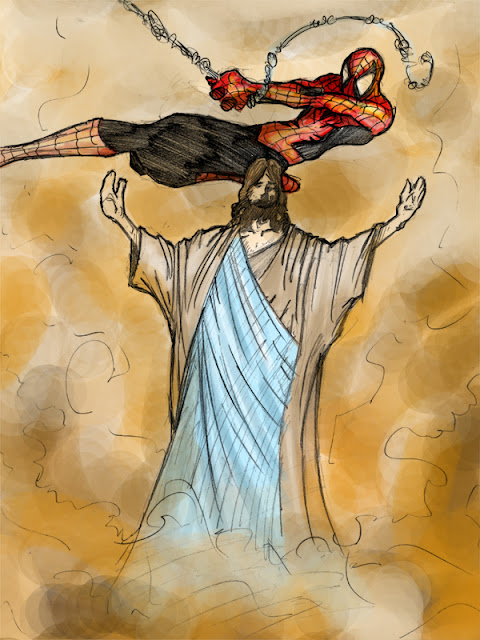I don’t typically look to summer blockbusters or superheroes
for the starting point of a homily,
but in light of today’s readings
I could not help but think
of the new “reboot” of Spider-man
that debuted this past week.
The villain in the movie,
the one-armed mad scientist Dr. Curt Conners,
is driven to harness the regenerative power of reptiles –
you know, the way that lizards can regrow their tails –
not only so that he can regrow his own missing arm,
but so that he might create, as he puts it,
“a world without weakness.”
Well, as usually happens to mad scientists,
Dr. Connors’s ambitions involve him
in some serious technological overreach and
(spoiler alert!)
he ends up turning himself
into a giant reptilian monster
and terrorizing New York City
until Spider-man comes along
to save the day.
As I said, I don’t usually look for wisdom from movies,
particularly not from ones
in which the main character dresses in Spandex,
but in this case I think that,
in addition to some awesome 3-D special effects,
we have a genuine insight:
our desire to create a world without weakness,
no matter how well intentioned it may seem,
will in the end destroy our humanity,
because in this life
weakness is part of our human condition.
It was the rhetoric of ridding the world of weakness
that accompanied Hitler’s murderous campaign
to cleanse the world of so-called inferior races.
It is perhaps a desire for a world without weakness
that accounts for the fact that at least 70% of pregnancies
in which the fetus is diagnosed with Down Syndrome
are terminated.
It is the quest for what we might call
“a Church without weakness”
that leads some to desire a smaller, “purer” Church,
presumably one that is rid of all those
who might struggle with the teachings of the Church
on various matters of faith and morals.
And it is the desire for a self without weakness
that leads us either to deny our own frailty,
or to loath the frailty within ourselves
that we cannot deny.
Our second reading,
from Paul’s Second Letter to the Corinthians,
is one of the New Testament’s profound reflections
on the grace of living in a world of weakness.
Paul says that God gave him
a “thorn in the flesh,
an angel [or ‘messenger’] of Satan” –
in order to remind him of his weakness.
This might refer to a physical disability
or perhaps to some sort of moral temptation
to which Paul was prone,
but, whatever the nature of this “thorn,”
when Paul prays three times to have it removed
God says in reply, “My grace is sufficient for you,
for power is made perfect in weakness.”
Power is made perfect in weakness.
St. Thomas Aquinas comments
that this is “a remarkable way of speaking,”
sort of like saying
“fire increases in water” (Super 2 Cor. cap. 12 lec. 3).
But this remarkable way of speaking
should be, for we who are Christians,
our native language,
because it allows us to speak eloquently of God’s grace.
If we boast of our weakness –
if we acknowledge our fragility –
then, Paul tells us,
the power of Christ will dwell in us.
The power of Christ is not a power
that makes a world without weakness
but rather a power that makes its dwelling
within our world of weakness,
a power that inhabits weakness,
in order to offer a way through weakness
into God’s embrace.
The cross shows us
the perfection of power in weakness in all its mystery,
for it is our faith as Christians
that through the cross of Jesus
God has poured out the power of grace,
a grace abundant to save an entire world of weakness.
And when we know our own weakness we are set free
to embrace the very power of God.
When we accept our own weakness
we are also set free to accept the weakness of others,
to give up our dream of the perfect spouse or child,
our dream of the perfect Church,
our dream of a world without weakness.
To know your own weakness is to have God’s Spirit
open your heart to others
in compassion and mercy.
What is your weakness?
What is the thorn in your flesh?
In a sense, it doesn’t matter.
What matters
is that we all live in a world of weakness.
What matters
is that God invites us today to know our weakness
so that we may know fully
the power of God’s grace at work in us.
We should not seek a world without weakness,
for when we are weak –
when we know our own helplessness
and our need for mercy –
it is then we are strong in mercy
through the power of God.

No comments:
New comments are not allowed.